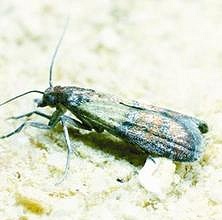ABC PEST CONTROL
CALL US NOW ON
0800 5118129 OR 07970 454573
Same Day Service
Free Quote and Survey
Unmarked Vehicles
Indian Meal Moth

Description: Adult moths are about 8 to 10mm long when at rest and have a wing span of about 14 to 20mm. When viewed from above with the wings folded over the back, the outer third of the wing appears reddish-brown or bronze coloured "at the wing tips" while the inner two thirds of the wing "at the basal portion" is light grey to ochre-yellow. Also, the head and thorax are reddish-brown and the hind wings grey. Brown-headed larvae are dirty white, sometimes tinged pink or green.
Biology: The larvae feed on cereals, grains, dried fruits and nuts. The night active female moth lays between 60 and 300 eggs, singly or in clusters, on or near foodstuffs. Eggs hatch in 2 to 14 days with larvae of "tiny whitish caterpillars" dispersing within a few hours. Larvae move to foodstuffs, and feed in or near a tunnel-like case of frass and silk which they web together. Under good conditions, the entire life cycle requires six to eight weeks and can be active all year round. However, in cold climates, larvae over-winter and pupate in March.
Control: Controlling this pest requires careful inspection of all stored cereal foods, discarding the heavily infested material. Flour dust and other debris in cracks and crevices needs to be cleaned away or vacuumed. After a thorough cleaning, treatment can be carried out using a residual insecticide, or ULV(Ultra Low Volume) for larger infestations or big areas.
We cover all forms of Pest Control, Rats, Mice, Cockroaches, Fleas, Bed Bugs, Wasps, Bees, Flies, Squirrels, Foxes, Birds, Moths and Carpet Beetles.
Pest Control London ~ Pest Control North London ~ Pest Control South East London ~ Pest Control Central London ~ Moth Control London ~ Moths London ~ Pest Control Essex
